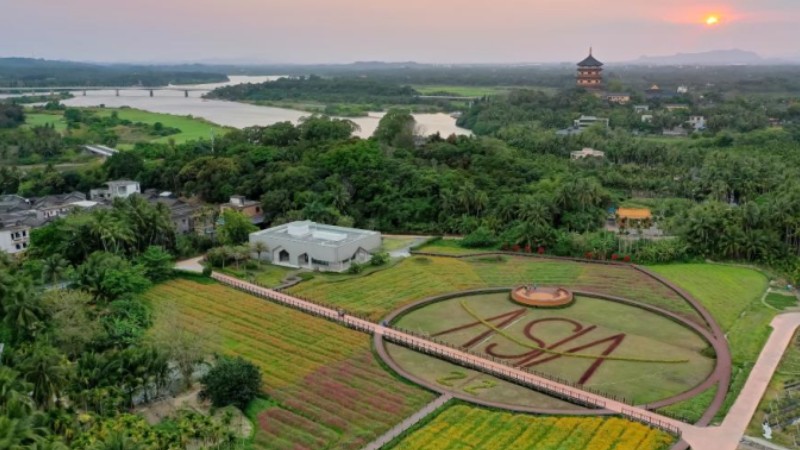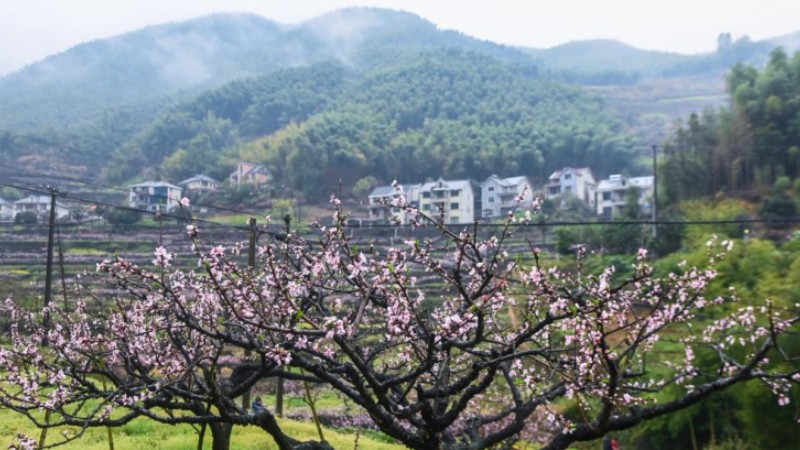Change, hope and future: Chinese children's choir open door to a brighter future in remote mountain village
"If you visit to the lovely Malan one day, don't forget to sing the ballad in your heart and tell kids that love exists in the world…"
This is a folk song that Xi Qingru, an 11-year-old girl at Malan Primary School in Fuping County, a mountainous area in north China's Hebei Province, loves. The first time she walked out of the deep mountains was to perform with the Malanhua Children's Choir at the opening ceremony of the Beijing 2022 Winter Olympic Games.
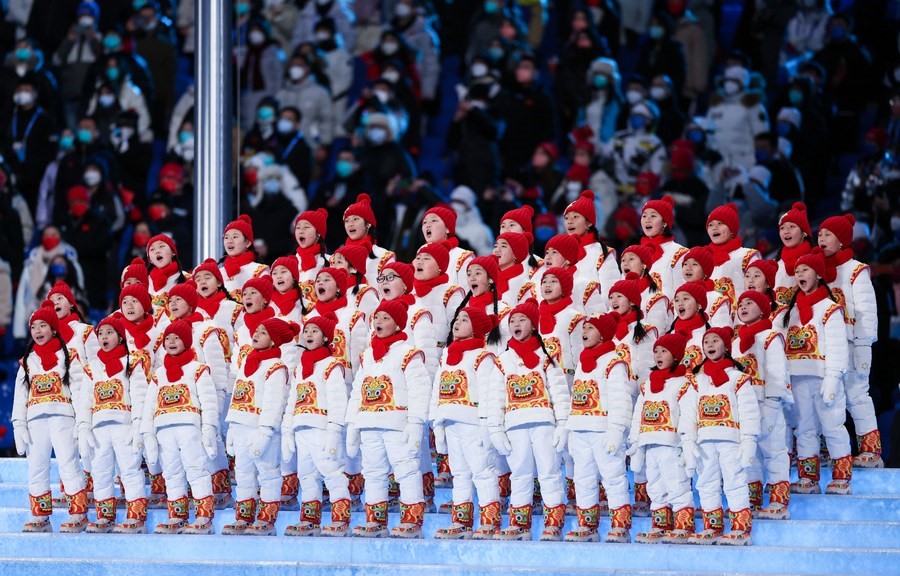
Malanhua Children's Choir sing the Olympic Anthem during the opening ceremony of the Beijing 2022 Olympic Winter Games at the National Stadium in Beijing, Feb. 4, 2022. (Xinhua/Cao Can)
On the evening of February 4, together with 43 other kids from Malanhua Children’s Choir, Qingru sang the Olympic Anthem in perfect Greek in a crystal-clear voice at the National Stadium, drawing applause from audiences across the world. "The Bird's Nest is really grand and I am excited to have the opportunity of letting the world hear us sing," Qingru said.
Music provides comfort, growth and guidance
Qingru has loved music since she was little. She listened closely to her older sisters when they hummed tunes at home. At age 9, Qingru started taking music lessons from the teacher in Malan Village and played in the Malan Kids Band.
The band's young members sang their endearing tunes beneath lush mountains and next to flowing waters. Qingru learned both local ballads like the Malan Nursery Rhymes and internationally known songs like Ode to Joy. Along with singing, she has studied various instruments, and plays the guitar, harmonica, and violin.
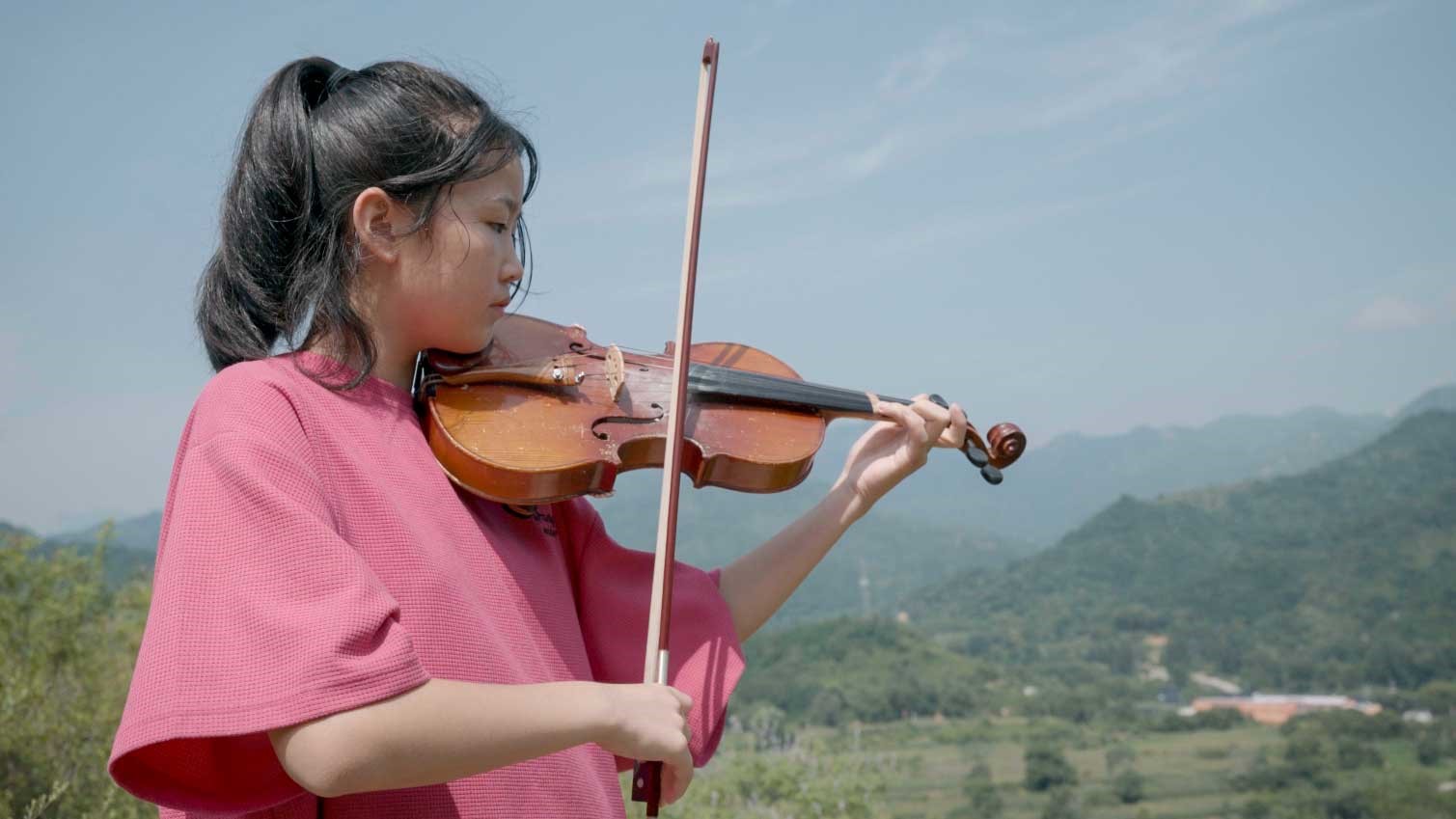
Xi Qingru plays the violin in the mountains on July 26, 2022,. (People's Daily Online/Liu Ning)
The mountains gave the girl a voice like a lark and a heart as pure as spring. When asked about her hopes for the future, Qingru responded, "I intend to continue studying music. When I grow up, I plan to enroll in a music conservatory, become a music teacher, and then come back to the mountains to share the joy of music with children."
In September 2021,, after receiving an invitation from the directing team of the opening ceremony of the Beijing 2022 Winter Olympics, the Malanhua Children's Choir was established. After going through a process of selection, Qingru's distinct voice and specific musical background allowed her to join the Malanhua Children's Choir.
Sadly, a week later, Qingru's mother was diagnosed with stomach cancer. She made the decision to leave the choir so that she could be with her mother in her final moments. Her mother's passing left Qingru feeling that all color had gone from her life.
Music has the magic to provide comfort for the grieving. "I missed my mum a lot after she passed away. I sing and play the violin to cheer myself up when I'm down. That makes me feel better," she said. After re-registering, she was chosen to join the choir in the choir's second selection.
Su Zhiyan, the instructor of the choir, told People's Daily Online, "All the kids in the choir are happy and worry free. They have become more confident and positive as a result of their involvement in the Beijing 2022 Winter Olympics. In my opinion, this will stay with them for a long time, allowing them to go farther and have greater vision."
A shorted road to school for students
The choir arrived in Beijing to rehearse a month before the Beijing 2022 opening ceremony, and Qingru threw herself into the performance. "I focused on singing well while I was on stage. After the performance was done, I really wanted to see my father," Qingru said.

Xi Qingru poses for a photo with Bing Dwen Dwen, the mascot for the Beijing 2022 Olympic Winter Games, July 26, 2022. (People's Daily Online/Yuan Meng)
Xi Jinhai, Qingru's father, is a farmer. He watched her daughter's performance at the Beijing 2022 opening ceremony on TV at his home in Malan New Community. The family was relocated from a cottage in Chayegou Village to a new fully-funded 135-square-meter apartment in Malan New Community in 2019. Most of the residents here were previously from poverty-stricken households.
"My daughter used to have to walk for more than an hour from home to school. After relocating, it just takes her a few minutes," Xi Jinhai said.
Qingru is also pleased with her new place. "The new home is quite impressive. It's equipped with a heating system in winter and air conditioning in summer."
Malan Primary School has renovated its schoolhouse, built a new playground, library, multimedia classroom and activity room, and "we students all have a nutritious lunch for free," Qingru said.
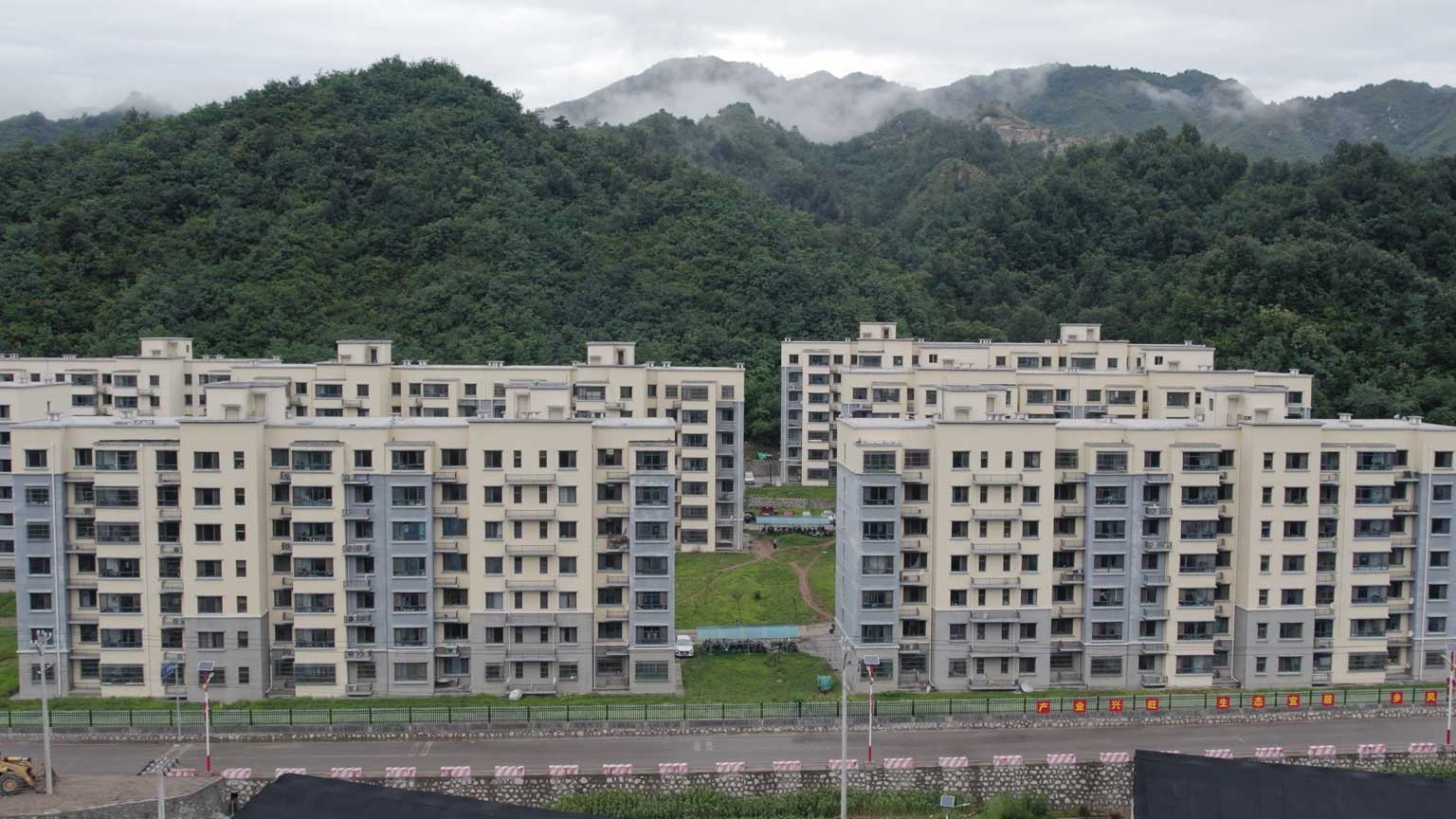
Photo taken on July 26, 2022 shows Malan New Community in Fuping county, north China’s Hebei Province. (People's Daily Online/Liu Ning)
"Many children in the choir used to live impoverished lives, but they were all lifted out of poverty and now live happy lives. Moreover, they also have more cultural education opportunities," said Su. "I'm confident that the children will have a better tomorrow!"
Fuping has restored more than 110 schools since 2013, and insists on providing "the best resources to education and best residences to students". The days of children racing to school through mountain roads are history.
Education breaks intergenerational poverty cycles
Fuping, located deep in the Taihang Mountains, and with little arable land, was once a severely impoverished county. Nearly half of its population were plagued by poverty in 2012.
During an inspection tour to Fuping county in December 2012, Chinese President Xi Jinping, who is also general secretary of the Communist Party of China (CPC) Central Committee, called on the whole Party and country to win the fight against poverty, stressing that if rural China, particularly impoverished areas, is left behind, a moderately prosperous society will not emerge.
As of November 2020, China has achieved the feat of delisting all its 832 impoverished counties nationwide from the poverty list, including Fuping County, after years of struggle. The vast changes in Fuping serve as a microcosm of the great achievements seen in China's poverty alleviation efforts. In 2021, the per capita disposable income of rural residents in the county reached 12,342 yuan, 3.7 times that of 2012.
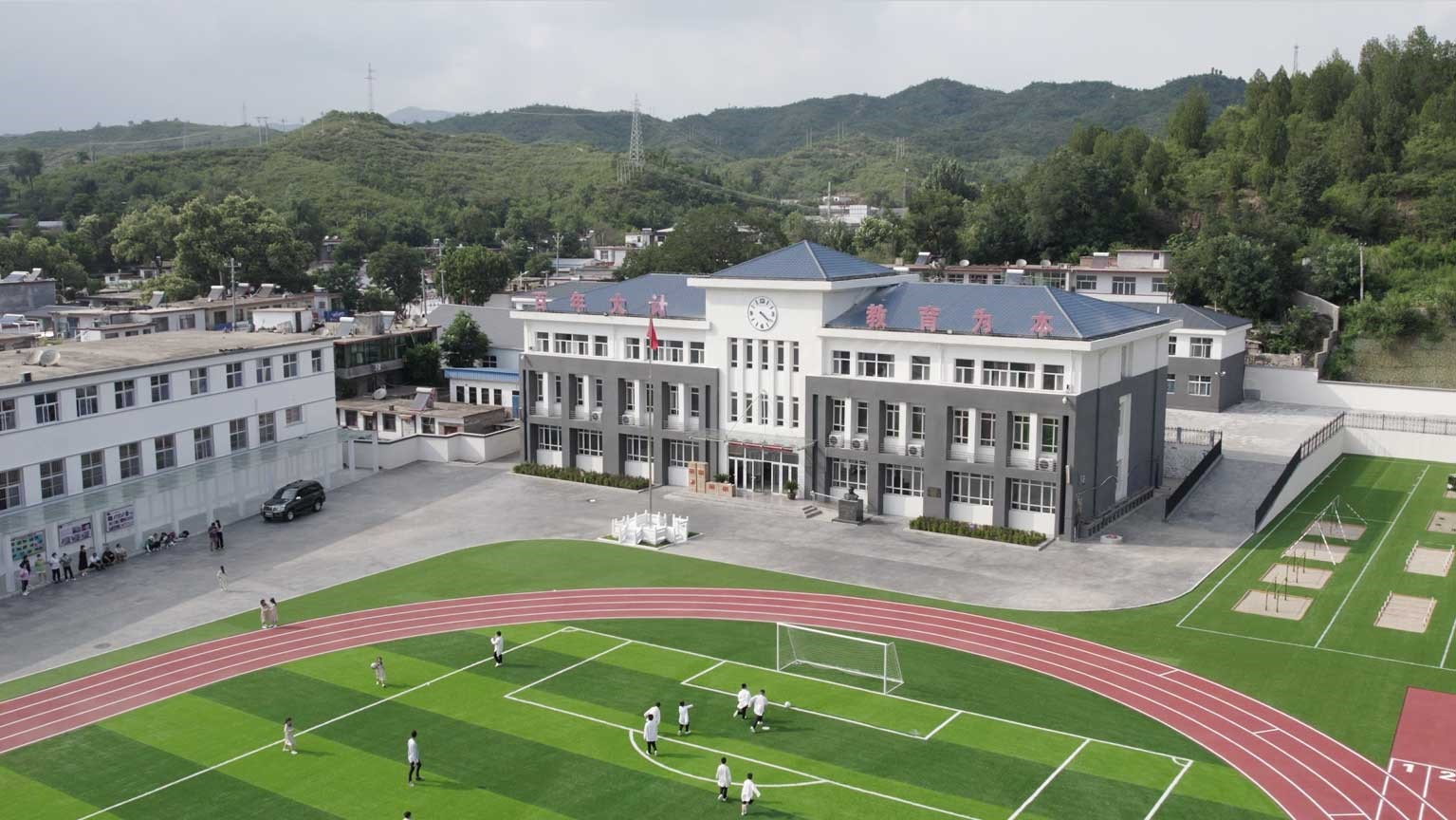
Children play on the playground at Fuping Bayi School in Fuping County, north China's Hebei Province, July 28th, 2022. (People's Daily Online/Liu Ning)
There were 42,811 students in Fuping in the first half of 2022, and the county provided aid to 30,384 of them totaling over 17.21 million yuan in 2021. It has given full benefits to students from poverty-stricken households, and the rate of school dropouts from nine-year compulsory education has been reduced to zero. Additionally, Fuping County has improved its school facilities, collaborated with renowned schools in Beijing and raised its teaching quality to ensure access to good quality education for all children in mountainous areas.
Fuping has continued to increase support for schools in relatively poor areas to improve their conditions, standard of teaching, faculties and financial resources, and advance rural vitalization. By providing students with quality education, the county has broken the cycle of intergenerational poverty and reversed their family fate.
Photos
Related Stories
- China strengthens support for poverty alleviation consolidation
- Villagers embrace new life in SW China's Liangshan Yi Autonomous Prefecture
- Incomes of people lifted out of poverty jump 14.3 pct in 2022
- China to further consolidate achievements of poverty alleviation: official
- Chinese vice premier stresses consolidating poverty alleviation achievements
- China's development creates opportunities for win-win cooperation
- China's poverty alleviation efforts of global significance: Cambodian official
- China's poverty alleviation experience worth learning: president emeritus of World Food Prize Foundation
- Chinese vice premier stresses consolidating poverty alleviation outcomes
- Miao ethnic people start new life after poverty alleviation resettlement
Copyright © 2023 People's Daily Online. All Rights Reserved.







